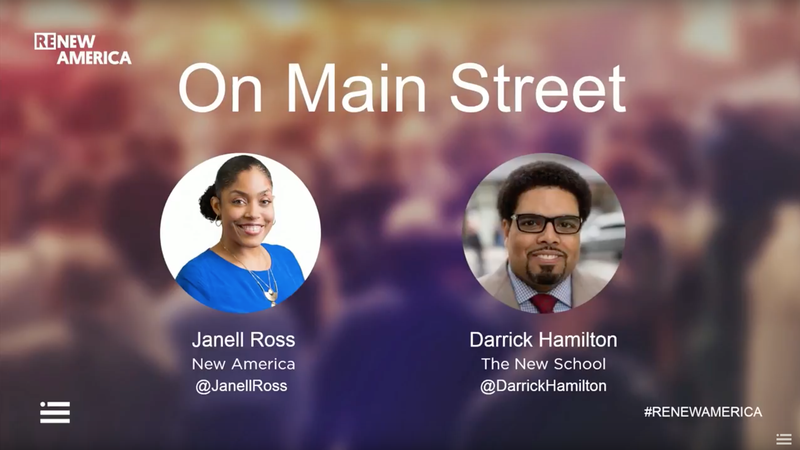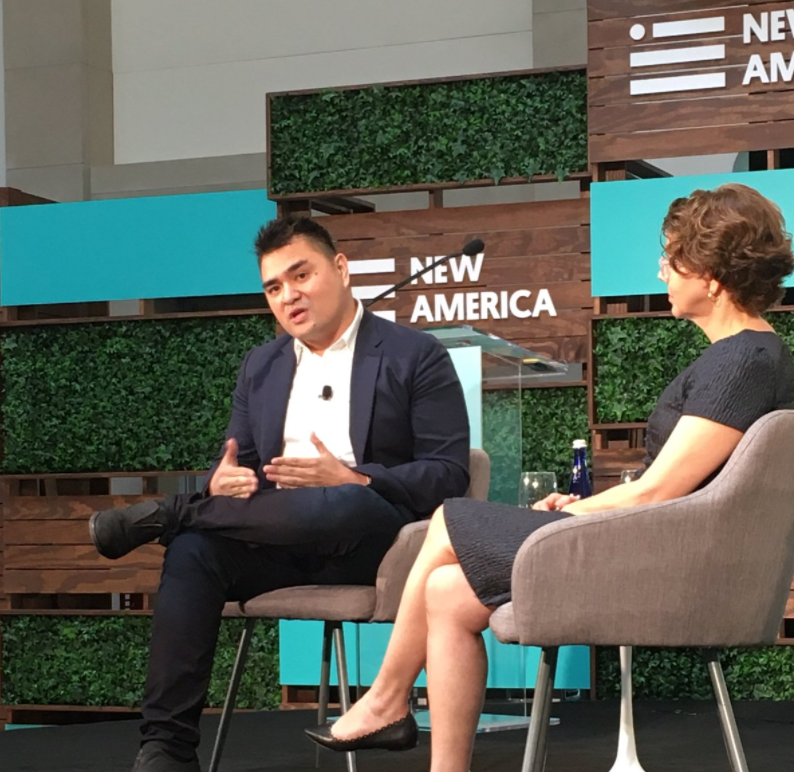#RenewAmerica
New America's 2017 Annual Conference
Blog Post

May 25, 2017
On the same day that special counsel was appointed to investigate possible Russian interference in the 2016 US election, leaders from across America gathered, just blocks from the White House, for conversations about renewing America’s core values, #RenewAmerica.

New America President and CEO Anne-Marie Slaughter made clear that this year’s annual conference was not a nostalgia for an earlier period in history, but a renovation of America built on its core values. Since its founding, New America has been a champion of new ideas. Recognizing the power of local solutions, the organization has expanded and supported work in new geographies. In California, we are supporting our second class of fellows, each social entrepreneurs who are building a better future by solving today’s problems. The #CAfellows attended and spoke at this year’s annual conference, cross-pollinating ideas for local solutions to global problems.
Education, economic security, and racial justice are three of the most serious issues facing America, and California, today. New America Fellow Marcia Chatelain started the conversation by quoting Dr. King, “Unfortunately [racial harmony] is a fantasy of self deception and comfortable vanity.” That vanity was shaken on November 8, 2016. Nearly 50 years later, we are still grappling with inequality, “in our classroom, at the benches in our courtrooms, at the ballot box, and on the corridors of our main streets. She challenged the audience not to “confuse the progress of some for liberation for all,” and that “time is always right to do what's right."

On the day following the 63rd anniversary of Brown v. Board, New America fellow Nikole Hannah-Jones schooled the audience on three prevailing myths about school segregation: integration is too difficult, bussing destroyed efforts to integrate, and we can make separate equal now. Citing data from the Department of Education, Hannah-Jones shared, “that you can determine the success of a student by how Black a school is, to this day,” which helps explain the achievement gap. Nikole Hannah-Jones concluded by challenging, “those who believe in integration to live lives of integration.”

In a slew of statistics that remind us how unjust our justice system really is, Theodore Johnson reminded us that although marijuana use is even between Black and Whites, Blacks are 10 times more likely to be convicted of drug possession. Marilyn Mosby, Maryland’s State Attorney from the City of Baltimore, argued for a multifaceted approach that includes representation as part of the solution. As a woman of color, Mosby represents one percent of all elected prosecutors in America. Mosby channeled former California Attorney General and current US Senator Kamala Harris by promoting smart on crime strategies, starting at the local level.

Kristen Clarke, representing the Lawyer’s Committee on Civil & Human Rights Under Law, illuminated the ways in which Voter ID laws, felon disenfranchisement, and other voter suppression tactics have been used to keep African Americans from the ballot box. Clarke called the right to vote, "the most important civil right of our democracy," and offered suggestions for how to ensure that everyone has access.

Darrick Hamilton has authored numerous scholarly articles on socioeconomic stratification in education, marriage, wealth, homeownership, health (including mental health), and labor market outcomes. Talking about wealth inequality, Hamilton unpacked the myth that wealth is correlated to personal responsibility. Instead, data shows that a household led by a Black college graduate has a lower net wealth position than a family head by a white high school dropout. Ultimately, Hamilton argued for expanding the definition of economic well-being beyond growth, and promoted big ideas like reparations, baby bonds, and a federal jobs guarantee to reduce the threat of unemployment.

One of the most expensive parts of the federal and family budget is the healthcare system. With federal policy in the lurch, Avik Roy & Atul Gawande made the bipartisan case for universal coverage. An early promoter of the insurance exchange and proponents of CA Gov. Schwarzenegger’s healthcare plan, New America has long promoted innovative solutions to this growing problem. Though divergent in approach, Roy and Gawande agreed it may be time to phase out America’s employer-based model, a shift that has been gaining traction in California and states across the country.

California is the most diverse state in the country, but many states are only beginning to understand what it means to live in a multiethnic society. To Jose Antonio Vargas, defining the word “American” is his full time job. Already a successful journalist, Vargas was catapulted onto the world stage when he came out as undocumented in 2011. Cecilia Muñoz, New America’s newest Vice President of Policy and Technology and Director of the National Network, interviewed Vargas, who contested the idea that America is divided. Instead, Vargas echoed a sentiment heard throughout the day; that the way to renew America is by listening and getting to know your neighbor.

In an effort to support civic technologists, New America recently launched the Technology in the Public Interest program. After an energetic opening with Baratunde Thurston and Vivian Graubard, innovators like CA Advisory Council member Jen Pahlka and 2016 CA fellows Marci Harris and Eric Liu led deep dive conversations about using technology to connect people to government.

Part of American renewal is about bridging educational, economic, technological and racial divides. But the other part is about bridging increasingly polarized political divides. Political experts on either side of the aisle - Yascha Mounk and Peter Wehner - shared their ideas for how to renew our political system. Wehner emphasized the importance of getting to know people who disagree with us, in order to humanize our fellow Americans. Mounk took a more extreme position, suggesting that it may be time to re-evaluate America’s democracy itself. Ultimately, both agreed that in order to renew America, we need to engage people locally and rebuild trust in the political system.
Joining the conversation, Dorian Warren reminded the audience that deindustrialization has unraveled America’s social fabric, but our reaction to unemployment has been inconsistent across communities. Like California, Texas is a highly diverse state with large urban centers. Lydia Bean talked about the importance of supporting multi-faith, multi-ethnic movements. All of the panelists promoted historical understanding, comparative analyses, and a respect for unique challenges Americans face today as ways to renew America.

Anne-Marie Slaughter closed the day in conversation with the internationally renown author Chimamanda Ngozi Adichie, who dazzled the audience with a powerful message about upholding America’s first amendment. Free speech is the hallmark of American democracy and has been a hotly contested issue on the campaign trail, on college campuses, and in communities across the country. Having grown up under military dictatorship in Nigeria, Adichie assured the audience that you are never going to change everyone’s mind, but the ability and the willingness to speak up for your beliefs is still what what makes America, America.
New America’s 2017 annual conference was a refreshing break from the negative news that dominates our timelines and news feeds. From researchers to reporters, from technologists to teachers, New America supports a wide range of experts who embrace the complexity and diversity of thought that is required to #RenewAmerica in the digital age. In California, our fellows are leading the way.